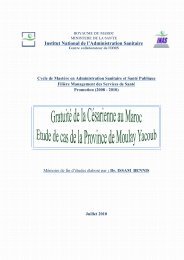institutional regime of past decades 6 isdecreasing, these new modalities, if continued,are bound to have a significant influence overhow development using international financingis done. No less important is the growing, stillsomewhat invisible influence of the privatesector, and of models that speak more to privatesector approaches than to conventional aidregimes, such as impact investing and socialbonds.The global evaluation community – those whosee themselves as practicing evaluators, whoattend conferences and engage with the body ofknowledge around evaluation theory andpractice – is largely unaware of these shifts, andlosing ground to consulting companies withcloser ties to the private sector. This has thepotential either to improve or devalueevaluation practice significantly in these arenas.It depends on how the global and Africancommunities of evaluators respond. In practice,evaluators and evaluation thought leaders inAfrica have toi. study and engage with these new actorsand instruments – also in line with astronger focus on the role of the privatesector and South-South collaboration indevelopment - in order to betterunderstand their definitions,approaches and impactsii. create and/or master relevantdevelopment and evaluationiii.frameworks, models and methodologiesensure a focus on potential unintended(negative) consequences and resultsduring and following experimentationwith new financing modalities andfunding instrumentsiv. understand how to evaluatepartnerships, coalitions and platformsin this type of dispensation.The search for evidence, impact andinfluencePressure on national resources, coupled to theongoing power shifts across the world, hasincreased the urgency with which authoritiesseek both influence and effective solutions forpressing aid and development challenges. In aworld increasingly driven by soundbytes andshort attention spans, quick results or ‘impact’and reductionist approaches are frequentlyvalued, especially in the aid environment, at theexpense of more realistic developmenttrajectories for solutions to complex challengesthat can sustain in the long run. A technocratdriven focus on ‘influence’ through ‘evidencebasedpolicy making’ raises endless debatesabout the merit of methods and how decisionmakerscan best be influenced, mostly withoutsufficiently questioning the basic premises andvalues underpinning these notions.African evaluators therefore need toi. refrain from being too reductionist intheir own methodologies while alsoevaluating for too-simple solutions, atthe same time ensuring that they canwork with systems and complexitywhen helping to design “theories ofchange” based M&E systemsii.iii.be clear on what is “credibleevidence”, and what it could mean interms of ethics and impact if poorlyproduced evidence, or ideology-drivenevidence is pushed for use by policymakershelp shift the emphasis from an almostexclusive engagement with impactevaluation, towards (i) equally criticalaspects such as evaluation forsustainable development andresilience, and (ii) strategies toempower, through evaluative practice,a variety of stakeholders participating inthe development initiatives.Innovation, technology, intellectualproperty and the knowledge societyAfrica is a frontrunner in adapting technologicalinnovations to their context, as demonstrated bythe world leading M-Pesa mobile phonebanking system in Kenya. There is a growingfocus on the continent on innovation,entrepreneurship and the use of information andknowledge – both international and indigenous– for the solving of intractable challenges on thecontinent. The mobile technology explosion isone of the reasons for the movement towards“big data”, while cyber security and theprotection of individual right to privacy as wellas intellectual property rights are increasingly ofconcern. In a knowledge economy people feeloverwhelmed with information, yet recognizethe need for knowledge and for understandinghow to deal with complexity and evidenceinformeddecision-making.This means that African evaluators also have to6 Consisting(of(the(IMF(and(international(finance(institutions(–(list(and(reference10
i. focus more on efforts to synthesizeknowledge produced throughevaluationsii.iii.In summaryunderstand and use the large data setsand new techniques that can supportevaluation data collection, yet alsorecognize and counter the ways inwhich these can be misleading andmisusedbe in a better position to evaluate“innovation” – and to innovate inevaluation itself.There are currently reams of documentsemerging analyzing global and African contextsover the next decade. The analysis above hasbeen cognizant of several and will keepevolving. Although there are many implicationsfor the evaluation profession in!Africa,!several!main!aspects!requiring!attention!emerge.$$In essence, in addition to the1. dire need for sufficient capacities andthe application of evaluation standardsin order to conduct good qualityevaluations across the board2. thought leadership in evaluationtheory and practice, by manydisciplines and sectors, and theapplication of the resulting synthesizednew knowledge are urgently needed inorder to position Africa as a continentfrom which innovative frameworks,models and practices in evaluationemerge that are suitable for thechallenges faced by the continent3. while in parallel, strategies are neededto enhance the influence and power ofthe profession and the work of itsthought leaders in development.Thought leadership in theory and practice isurgently needed in priorities that includei. understanding the role of changingand complex contexts in evaluation,and using systems thinking forholistic solutionsii. the role of norms and values indevelopment and in evaluationiii. the need for Africa rooted and Africaled evaluationiv. policy coherence from national toglobal levels, to be analyzed intandem with the micro-macrodisconnectv. mutual accountability indevelopment financing programsand in development interventionsvi. evaluation beyond an obsessionwith “impact”, to include a strongerfocus on “managing for impact”(which includes ongoing monitoringfor impact, learning and adaptivemanagement); concepts such asvulnerability, sustainability andresilience; and a nuancedinterpretation of “value for money”vii. engaging with sensitive issues suchas macro political trends, the oftenmindless rhetoric around conceptssuch as democracy and humanrights, and the ongoing obscuring oftruth in ‘evidence’, and their role inthe effectiveness of developmentstrategiesviii. searching for unintendedconsequences and unexpectedimpactsix. synthesis that produces usefulknowledgex. evaluation in priority content areas,such as• climate change, food and watersecurity• human security• power and empowerment• relationships, especially inpartnerships, coalitions,networks, platforms• creativity, innovation andentrepreneurship• institutional systems for goodgovernance, including theelimination of corruption• impact investing, social bondsand other influences of theprivate sector.11








